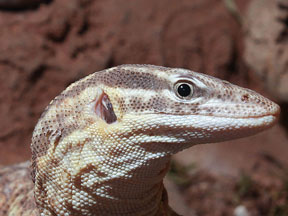Q: I am thinking of purchasing a yellow ackie monitor (Acanthurus bracyurus) for my son. I have some experience with snakes but have never owned a
Q: I am thinking of purchasing a yellow ackie monitor (Acanthurus bracyurus) for my son. I have some experience with snakes but have never owned a monitor. I’m told that their saliva contains a lot of bacteria. How serious can a bite from this lizard be?
A: I sure would like to know how old your son is, as that would influence my advice to you. Young children should not be expected to know how to properly practice good hygiene after handling any herp, so close supervision should always be maintained when any child is around herps.
Children need to understand that animals are live creatures and require gentle handling. Even the tamest reptile is still considered a wild animal, meaning that it may snap, bite or whip its tails if frightened, injured or alarmed.
Herps have the potential to spread organisms that can make a child sick. Children need to know not to touch their face or eat any food before thoroughly washing their hands after handling any reptile. Some youngsters are even tempted to kiss their beloved pet herp. This must be seriously discouraged. It is often a difficult concept for a child to understand that reptiles may carry organisms that can make them ill.
Monitors carry potentially dangerous bacteria in their mouths, and on their claws, that can cause a serious infection if a human is bitten or scratched. Because many monitors eat carrion, or dead animals, the bacteria found in decomposing flesh, while not dangerous to the monitor consuming it, could definitely be of concern to any human exposed to it.
While it is possible to reduce the potential for dangerous bacteria, by not feeding rotting meat and sticking to freshly killed animals, cooked egg and canned monitor diets, for example, there is still a chance that pathogenic, disease-causing, bacteria may be found in the oral cavity and around the teeth. You could have your herp veterinarian perform bacterial cultures to identify any potential pathogenic organisms, but this still would not guarantee that a bite wouldn’t cause infection.
Monitors seem to harbor more pathogens than many other species of reptile. Perhaps it would be best to consider a more docile lizard, such as the bearded dragon, as a first lizard for a child. Again, I must reiterate that the decision to give a herp to a child depends as much on the age and understanding level of the child as it does on the type of lizard being considered. While any lizard has the ability to bite, some species are known as being more irascible than others.
Need a Herp Vet?
If you are looking for a herp-knowledgeable veterinarian in your area, a good place to start is by checking the list of members on the Association of Reptilian and Amphibian Veterinarian (ARAV) web site at www.arav.com. Look for DVMs who appear to maintain actual veterinary offices that you could contact.



